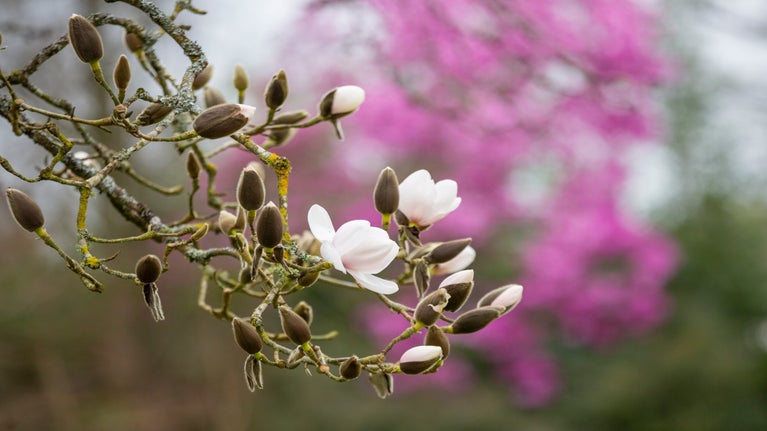
Discover more at Knightshayes
Find out when Knightshayes is open, how to get here, the things to see and do and more.

Lose yourself in the garden at Knightshayes, home to one of the most extensive plant collections to be found in the care of the National Trust. With a walled kitchen garden, terraces, Paved Garden and the Garden in the Wood, there is plenty to see all year round.
The formal and woodland garden is divided into eight separate areas. These become less structured and more informal as you move further from the house.
Head to the formal garden for views across the parkland, and look out from the raised terraces in the kitchen garden across the vegetable beds to the trees that surround it.
Spring is the time of the year when the frost fades away, but fresh air remains, flushing away those wintery cobwebs and revealing signs of new fauna and flora.
The lawns reveal a carpet of colour as crocus pop up all throughout the garden. There's also an abundance of daffodils and hyacinths as you walk along the paths around the garden. Keep your eyes peeled for snowdrops which have almost finished flowering, as well as bluebells injecting new colour to the beds beneath trees.
Take a camellia walk around the garden. There's a whole range of colours and varieties of camellia in the plant collection at Knightshayes, be prepared to keep your eyes peeled for a display all around the garden.
Through this part of the garden, you'll be able to see a number of rhododendrons bursting into life, with plenty of buds ready to flower. Be sure to spot the 'rhododendron falconeri' and 'grevillea rosmarinifolia jenkins'.
In this area of the garden, there's a range of Pieris, with the 'pieris japonica' already blossomed into its fiery colour, and the 'peiris formoca'. There are also many snowdrops and bluebells in the wood during the winter and spring.
In early spring, you can't miss the magnolia along this wide grassy area. It's a great place to take a picture, with a view over the pool garden and Tiverton. Later in spring, this area is edged with vivid purple rhododendrons.
In these areas, you'll spot a delicate cherry blossom ready to flower, and plenty of jolly, colourful hellebores.

With far-reaching views across the parkland towards Tiverton and the Heathcoat factory, the view is framed by a Cedar of Lebanon, which grows on the site of the earlier house's kitchen garden.
Originally planted as a rose garden, all that remains of this 19th-century scheme is the formal paving and traces of the old beds in the grass.
Now you can see deep herbaceous borders, yew hedges enclosing trefoil-shaped beds and a planting scheme of soft colours, beloved by Lady Heathcoat Amory.
The Paved Garden is a more intimate garden, full of soft purples and greys during the spring and summer months. Stop for a while and relax on a bench or enjoy the collection of herbs and colourful bulbs growing in the flower beds during the warmer months.
A diverse mix of dark and intimate trails, leading to spacious sunlit glades. Take in views over the garden or rest in the Cedar House, built to celebrate the completion of the garden. This area of the garden is at its best in the spring and autumn.

Take a walk around the arboretum, full of impressive mature oak and towering conifers providing height and grandeur. Look out for the sequoia trees which can grow to become some of the tallest in the world. The arboretum is also home to the bulb meadow, which flowers between March and June.
Relax in the open and sunlit South Garden, full of exotic trees including Japanese cherries. Take in the sweeping views of Knightshayes framed by a lawn full of colourful wild flowers in summer. This part of the garden is best visited during summer and spring.
The one-hectare (2.5-acre) walled kitchen garden, complete with fairy-tale turrets, is home to a vast collection of crops. These are now almost extinct, including 102 varieties of heritage tomatoes.
Whichever month you visit the kitchen garden there’s always plenty to see, from an abundance of rhubarb to plentiful pumpkins for Halloween.
Unusually for a restored garden, all the produce grown at Knightshayes is harvested and used. Despite its ornamental presentation, it’s a working kitchen garden.

Find out when Knightshayes is open, how to get here, the things to see and do and more.

The walled kitchen garden, home to a vast collection of crops, is a gardener’s delight. Find out about the work the team does to care for it, and the other areas of the garden.

Discover the ground floor of house at National Trust’s Knightshayes. See the details behind architect William Burges's gothic façade and a portrait that may be by Rembrandt. From Saturday 14 February the first floor of the house will also reopen for a peek into the private spaces of the Heathcoat-Amory family.

Explore the parkland and garden at Knightshayes with your dog. Follow our dog walking guidance and find your next adventure here. Knightshayes is a two pawprint rated place.

Grab a bite to eat and drink in the Stables Café, or browse the range of goods in our shop. You'll find all the details here.

Delve into over 200 years of history at Knightshayes. Discover the Heathcoat-Amory family history, how the house and garden was designed and developed, and Knightshayes’s sad connections with the Second World War.

From 18th-century water gardens and Arts and Crafts landscapes to intimate woodland gardens, there are so many places to discover.

Discover our gardeners’ top tips so you can make the most of your garden, plot or window box.

Take a stroll and explore the wide variety of the gardens we look after in Devon.